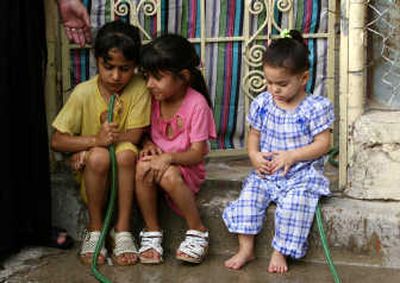Baghdad’s taps dry and temperatures high

BAGHDAD – Ahmed Aidan sells bottled water from his small grocery in a west Baghdad neighborhood, and he’s lucky he does.
The capital is suffering through a water shortage, linked to the crippled electricity grid that doesn’t deliver sufficient power to run purification plants and pumping stations.
“The situation is desperate. We’ve been getting tap water only one hour a day for a week now,” Aidan said. “We’ve gotten only one hour of electricity a day for the past four days. And the water we get during the night is muddy and undrinkable.”
Vast sections of the Iraqi capital had been without running water for 24 hours Thursday night, compounding the urban misery in a war zone in the blistering heat at the height of summer. Residents and city officials said large sections west of the capital had been virtually dry for six days.
Baghdad routinely suffers from water outages, but residents described the current bout as one of the most extended and widespread in recent memory. The problem highlights the larger difficulties in a capital beset by violence, crumbling infrastructure, rampant crime and too little electricity to keep cool more than four years after the U.S.-led invasion.
Jamil Hussein, a 52-year-old retired army officer who lives in northeast Baghdad, said his house has been without water for two weeks, except for two hours at night.
Two of his children have severe diarrhea that the doctor attributed to drinking what tap water was available, even after it was boiled. “We’ll have to continue drinking it, because we don’t have money to buy bottled water,” he said.
Adel al-Ardawi, a spokesman for the city government, said that even with sufficient electricity “it would take 24 hours for the water mains to refill so we can begin pumping to residents. And even then the water won’t be clean for a time. We just don’t have the electricity or fuel for our generators to keep the system flowing.”
Noah Miller, a spokesman for the U.S. reconstruction program in Baghdad, said that water treatment plants were working “as far as we know.”
He said a nationwide power blackout that lasted a few hours Wednesday night might be causing problems for all systems that depend on Iraq’s creaking electricity grid.
Many Baghdad residents have banded together to use power from neighborhood generators, but the cost of fuel – and therefore electricity – is skyrocketing. Diesel fuel was going for nearly $4 a gallon Thursday.
Meanwhile, the cost of purified bottled water has shot up 33 percent. A 10-liter bottle now costs $1.60.